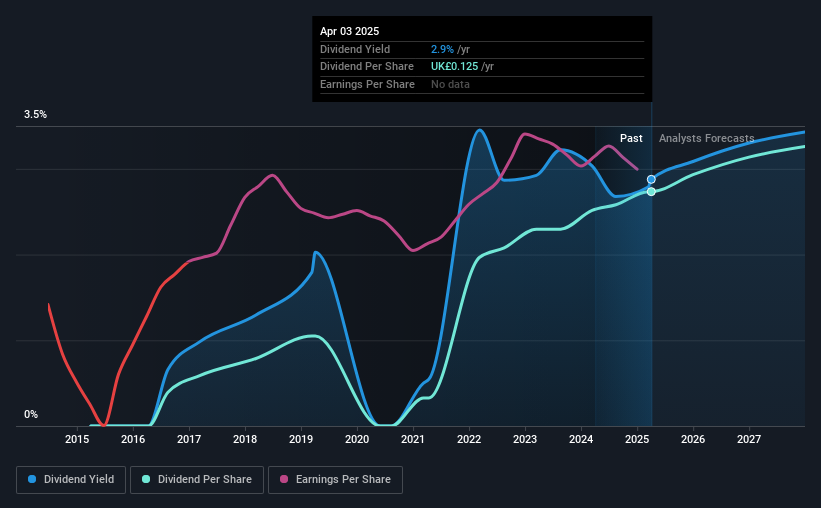- United Kingdom
- /
- Construction
- /
- LSE:BBY
Balfour Beatty's (LON:BBY) Shareholders Will Receive A Bigger Dividend Than Last Year

Balfour Beatty plc's (LON:BBY) dividend will be increasing from last year's payment of the same period to £0.087 on 2nd of July. This takes the annual payment to 2.9% of the current stock price, which unfortunately is below what the industry is paying.
Balfour Beatty's Payment Could Potentially Have Solid Earnings Coverage
If it is predictable over a long period, even low dividend yields can be attractive. Before making this announcement, Balfour Beatty was easily earning enough to cover the dividend. This means that most of its earnings are being retained to grow the business.
The next year is set to see EPS grow by 41.8%. If the dividend continues on this path, the payout ratio could be 28% by next year, which we think can be pretty sustainable going forward.

Check out our latest analysis for Balfour Beatty
Balfour Beatty's Dividend Has Lacked Consistency
Even in its relatively short history, the company has reduced the dividend at least once. This makes us cautious about the consistency of the dividend over a full economic cycle. Since 2016, the annual payment back then was £0.018, compared to the most recent full-year payment of £0.125. This implies that the company grew its distributions at a yearly rate of about 24% over that duration. Dividends have grown rapidly over this time, but with cuts in the past we are not certain that this stock will be a reliable source of income in the future.
The Dividend Looks Likely To Grow
Growing earnings per share could be a mitigating factor when considering the past fluctuations in the dividend. Balfour Beatty has impressed us by growing EPS at 13% per year over the past five years. A low payout ratio and decent growth suggests that the company is reinvesting well, and it also has plenty of room to increase the dividend over time.
We Really Like Balfour Beatty's Dividend
In summary, it is always positive to see the dividend being increased, and we are particularly pleased with its overall sustainability. Earnings are easily covering distributions, and the company is generating plenty of cash. Taking this all into consideration, this looks like it could be a good dividend opportunity.
Market movements attest to how highly valued a consistent dividend policy is compared to one which is more unpredictable. However, there are other things to consider for investors when analysing stock performance. Taking the debate a bit further, we've identified 2 warning signs for Balfour Beatty that investors need to be conscious of moving forward. Is Balfour Beatty not quite the opportunity you were looking for? Why not check out our selection of top dividend stocks.
Valuation is complex, but we're here to simplify it.
Discover if Balfour Beatty might be undervalued or overvalued with our detailed analysis, featuring fair value estimates, potential risks, dividends, insider trades, and its financial condition.
Access Free AnalysisHave feedback on this article? Concerned about the content? Get in touch with us directly. Alternatively, email editorial-team (at) simplywallst.com.
This article by Simply Wall St is general in nature. We provide commentary based on historical data and analyst forecasts only using an unbiased methodology and our articles are not intended to be financial advice. It does not constitute a recommendation to buy or sell any stock, and does not take account of your objectives, or your financial situation. We aim to bring you long-term focused analysis driven by fundamental data. Note that our analysis may not factor in the latest price-sensitive company announcements or qualitative material. Simply Wall St has no position in any stocks mentioned.
About LSE:BBY
Balfour Beatty
Balfour Beatty plc finances, develops, builds, maintains, and operates infrastructure in the United Kingdom, the United States, and internationally.
Excellent balance sheet and fair value.
Similar Companies
Market Insights
Community Narratives



